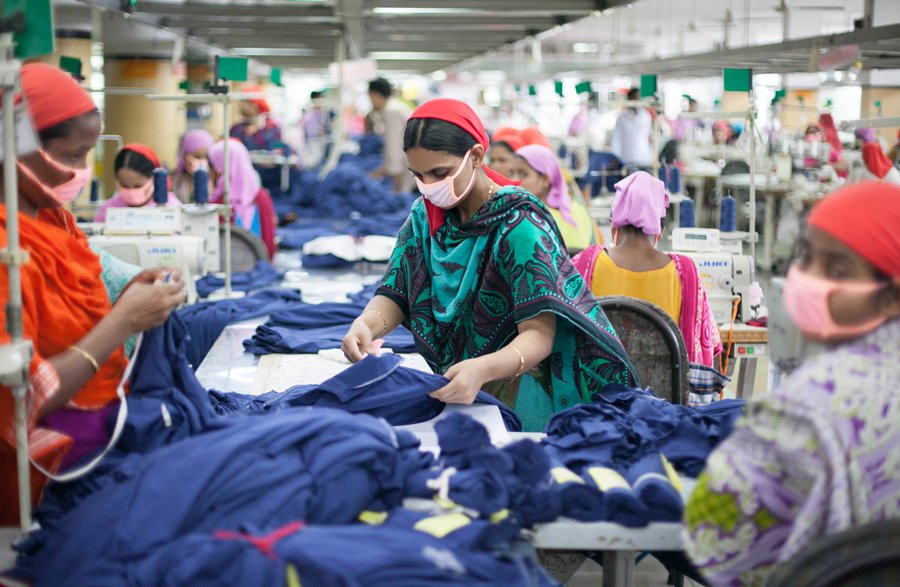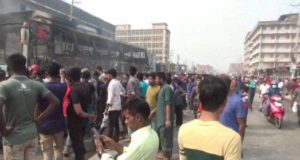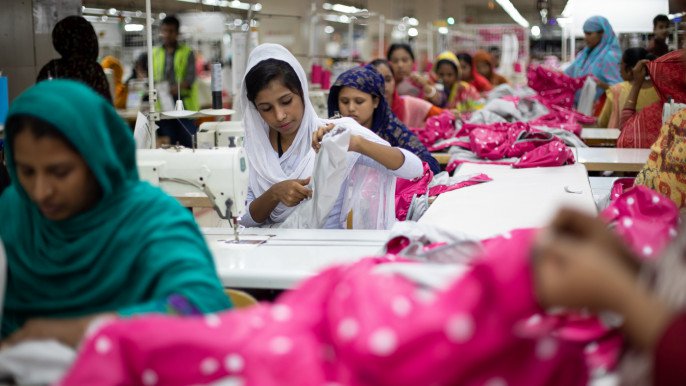Published in Dhaka Tribune on October 29, 2017

Photo: Mahmud Hossain Opu/ Dhaka Tribune
Though the business termination has apparently caused a decline in the number of work orders, foreign buyers will ultimately depend on Bangladesh as we sell quality products at affordable prices
RMG factories that did not meet the criteria on workplace safety by retailers’ platforms are now seeing a sharp decline in the number of work orders from foreign buyers.
Global fashion brands and retailers severed business ties with them upon their failure to comply and the latest data shows the total number of factories with which the platforms — Accord on Fire and Building Safety (otherwise called Accord) and Alliance for Bangladesh Worker Safety (Alliance) — cut ties reached 238. Of them, the Alliance terminated ties with 162 RMG units, and the Accord with 76.
Retailers and signatory brands covered under the Accord and the Alliance sent a letter urging them not to continue business with such factories. In the aftermath of termination letter, the manufactures are in a tight spot while already reeling under numerous challenges.
Speaking to the Dhaka Tribune, MG Fattah, managing director of Sincere Knit Garments Ltd, said: “After business termination by the buyers’ platforms, it is very difficult for us to establish contant with buyers and get work orders.
“I have stopped manufacturing products for buyers with whom I previously signed contracts. Now, I have to work very hard to find new buyers so that I can keep my factory alive.”
He added that as the buyers started to backtrack on agreements signed with producers resulting in a downward spiral in the overall production capacity of the country’s apparel industry.
In the same vein, another factory owner preferring to be anonymous said: “I am not receiving sufficient numbers of orders after retailers under the Accord cut ties. Taking advantage of the termination, buyers that are not affiliated to the platform are offering me lower prices.
“I have to incur massive losses as the orders declined substantially. It would have been better had the Accord allowed me to continue production in the existing factory for a few more months as I am relocating it to my own building, that is being built in compliance with all safety rules.”
Mozammel Haque, managing director of Deshone Apparels Ltd, echoed him, saying: “I had a production deal with a Polish buyer that was supposed to be in effect until February 2018. But following the termination, the buyer wants the deal to be revoked by the end of this year. He has already withdrawn orders for products supposed to be produced between January and February.
He added that he had sought a few months’ time, but the buyer refused to heed his calls.
“As the termination cost my business with a massive loss, I will take legal actions and ask for reparations [from the buyer and Accord],” Mozammel added.
Government and BGMEA to blame
Factory insiders have pinned the blame on the Bangladesh government and Bangladesh Garment Manufacturers and Exporters Association (BGMEA) for their losses as the authorities apparently failed to successfully negotiate with the platforms to safeguard the producers’ interests and also for the sake of the apparel sector that is considered to be the country’s lifeline.
Wishing anonymity, a factory owner said: “I think there is sort of negligence from the government and BGMEA. They failed to negotiate with the Accord. I wonder how a foreign organisation can ask buyers to refrain from sourcing products from Bangladesh by terming the country’s garment factories unsafe. How did Bangladesh accept this despite being a sovereign country?
“If you go through data and reports on the RMG sector, you will see no recent records of accidents in the factories. Nevertheless, these two platforms of retailers keep labeling our factories dangerous. It is high time we informed foreign buyers that our RMG factories have already become the safest industry in the world.”
2% of factories are risky
According to the latest data, 81% of safety concerns identified in 1,620 Accord-inspected factories were addressed, and 84% of highest priority risks and non-compliance issues addressed in 655 Alliance-inspected factories.
During the inspection, only 2% of the country’s total garment factories were found to be risky, which were already closed down.
‘Buyers bound to source products from Bangladesh’
BGMEA Senior Vice President Faruq Hassan said: “Though the business termination has apparently caused a decline in the number of work orders, foreign buyers will ultimately depend on Bangladesh as we sell quality products at affordable prices.
“Good news is that a large number of owners are relocating their factories in a bid to ensure workers’ safety and meet international standards. We never compromise on safety issues. We want a compliant industry for the sake of the manufacturers and also for a sustainable industry.”
He suggested that factory owners meet minimum safety standards as any accidents may tarnish the image of the entire industry and that of the country.
Following the Rana Plaza accident, global retailers formed the two platforms to improve safety standards in the sector in the face of vehement pressure from rights groups and trade unions.
 CPD RMG Study Stitching a better future for Bangladesh
CPD RMG Study Stitching a better future for Bangladesh



